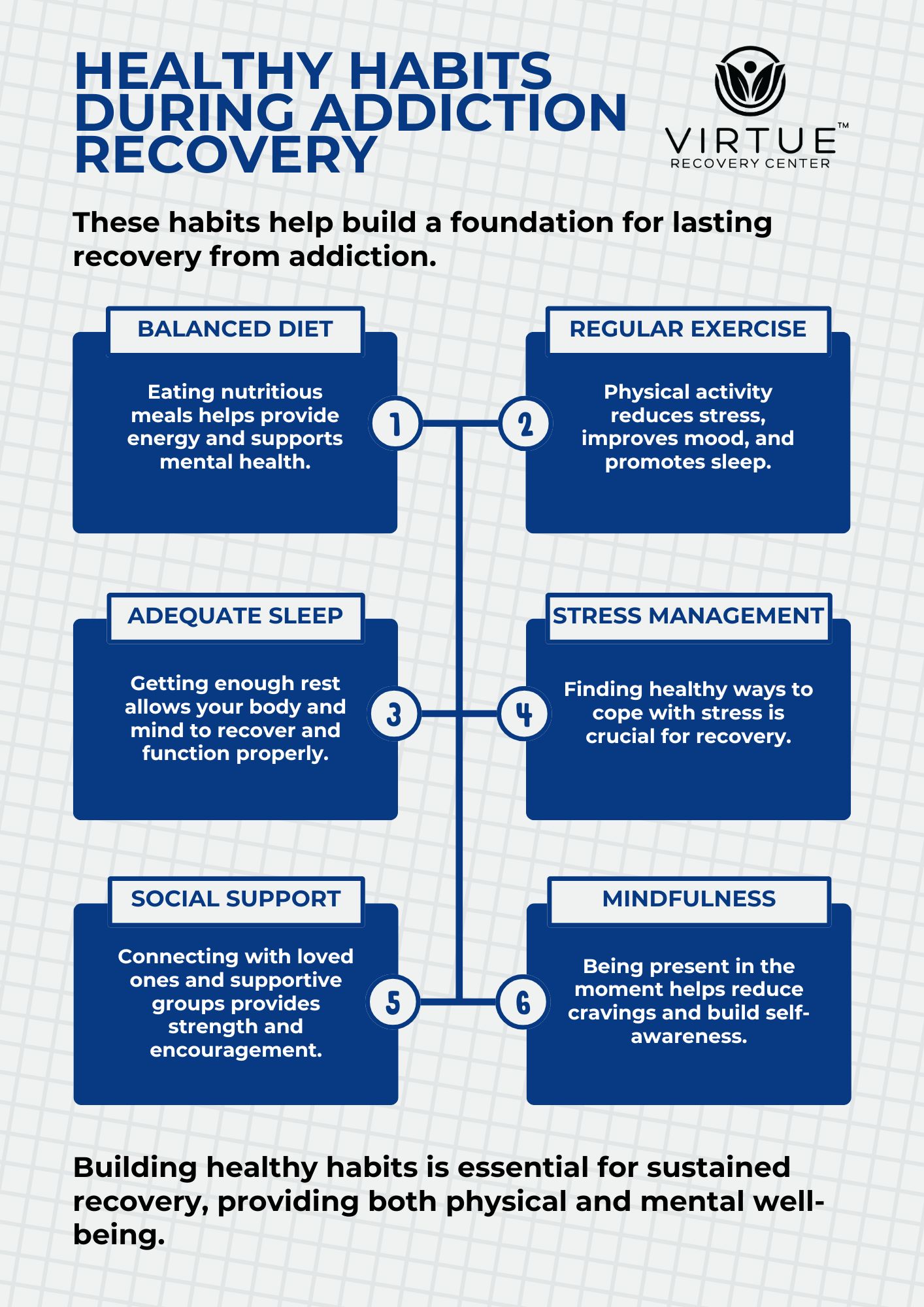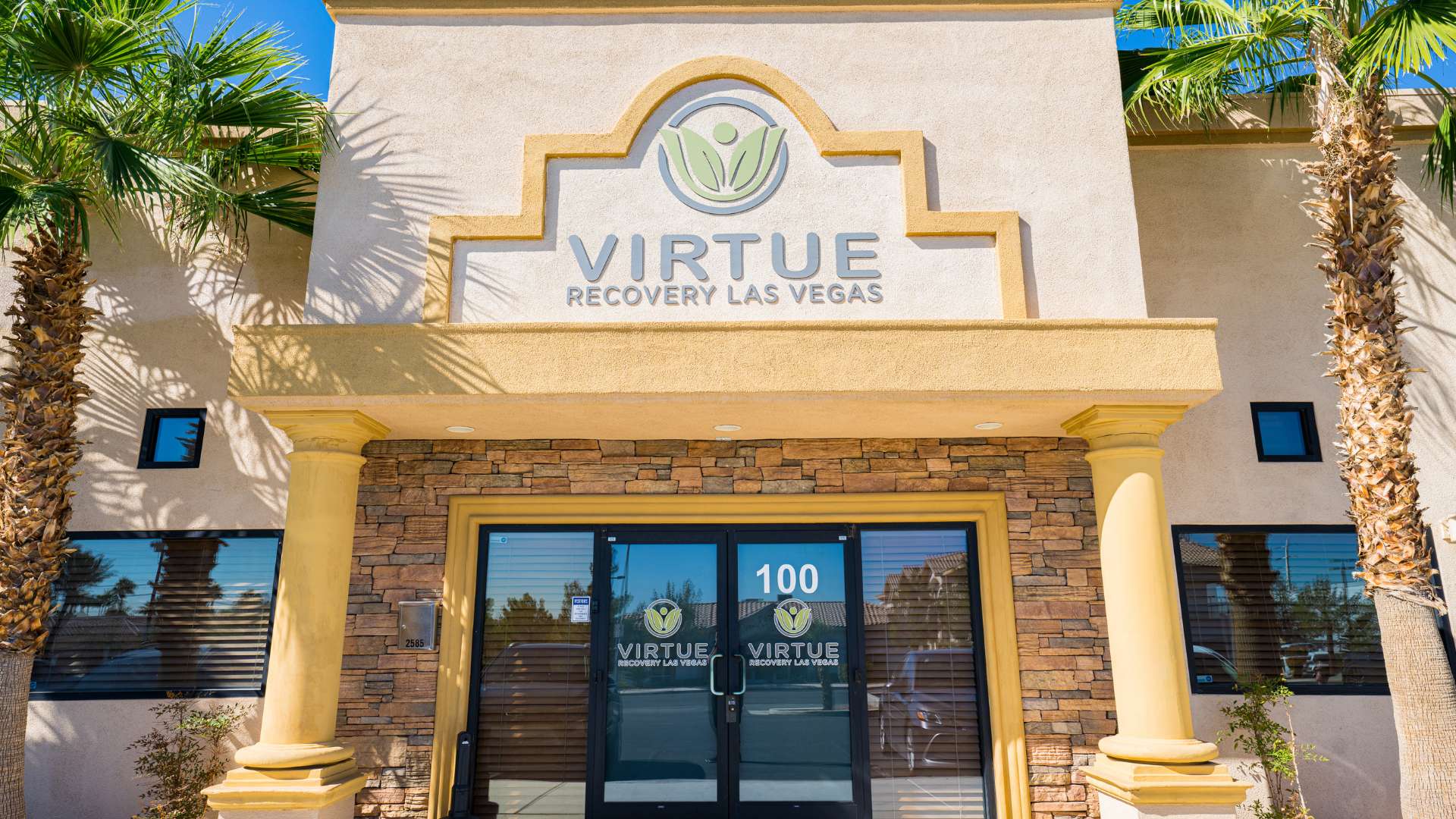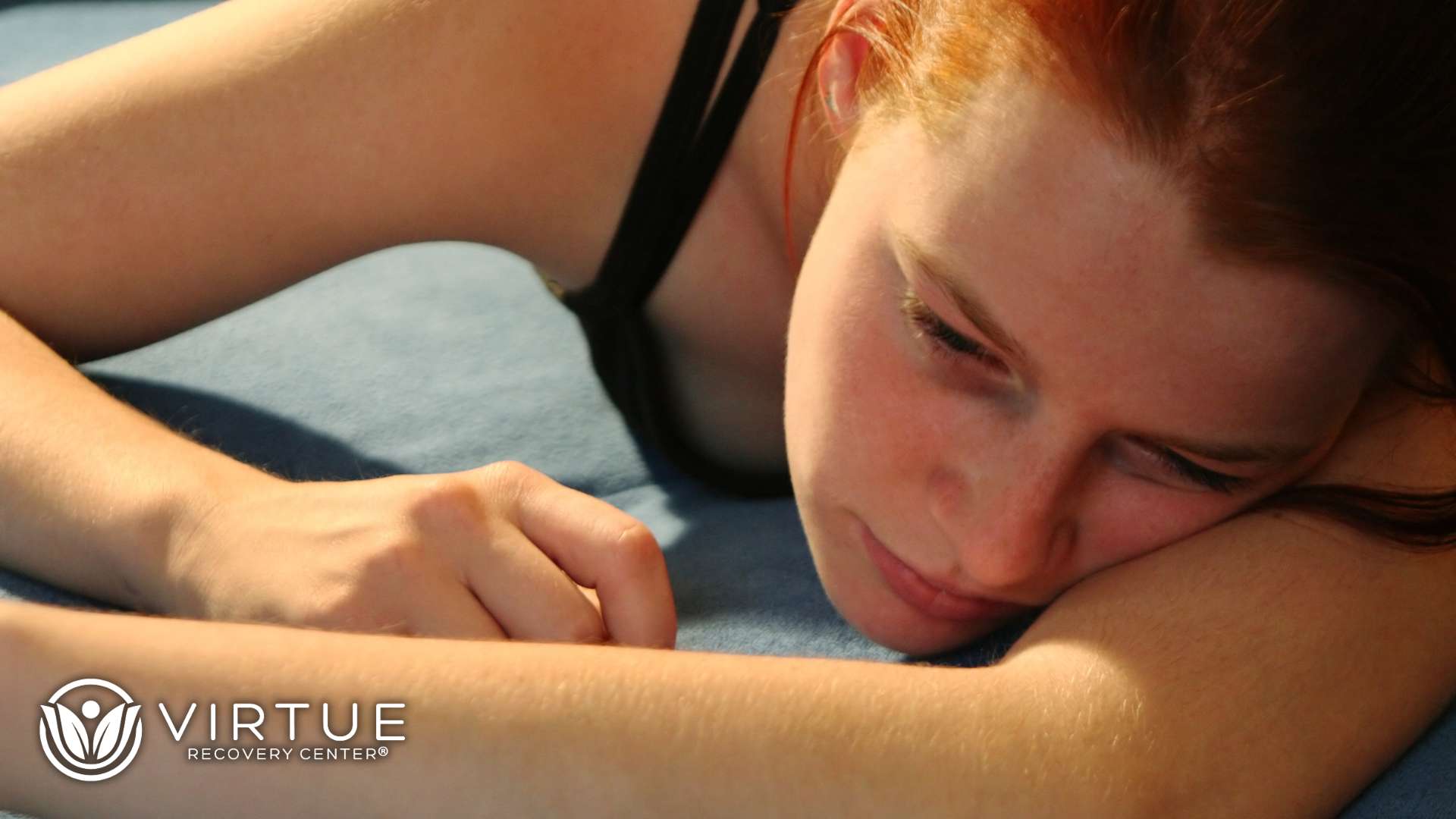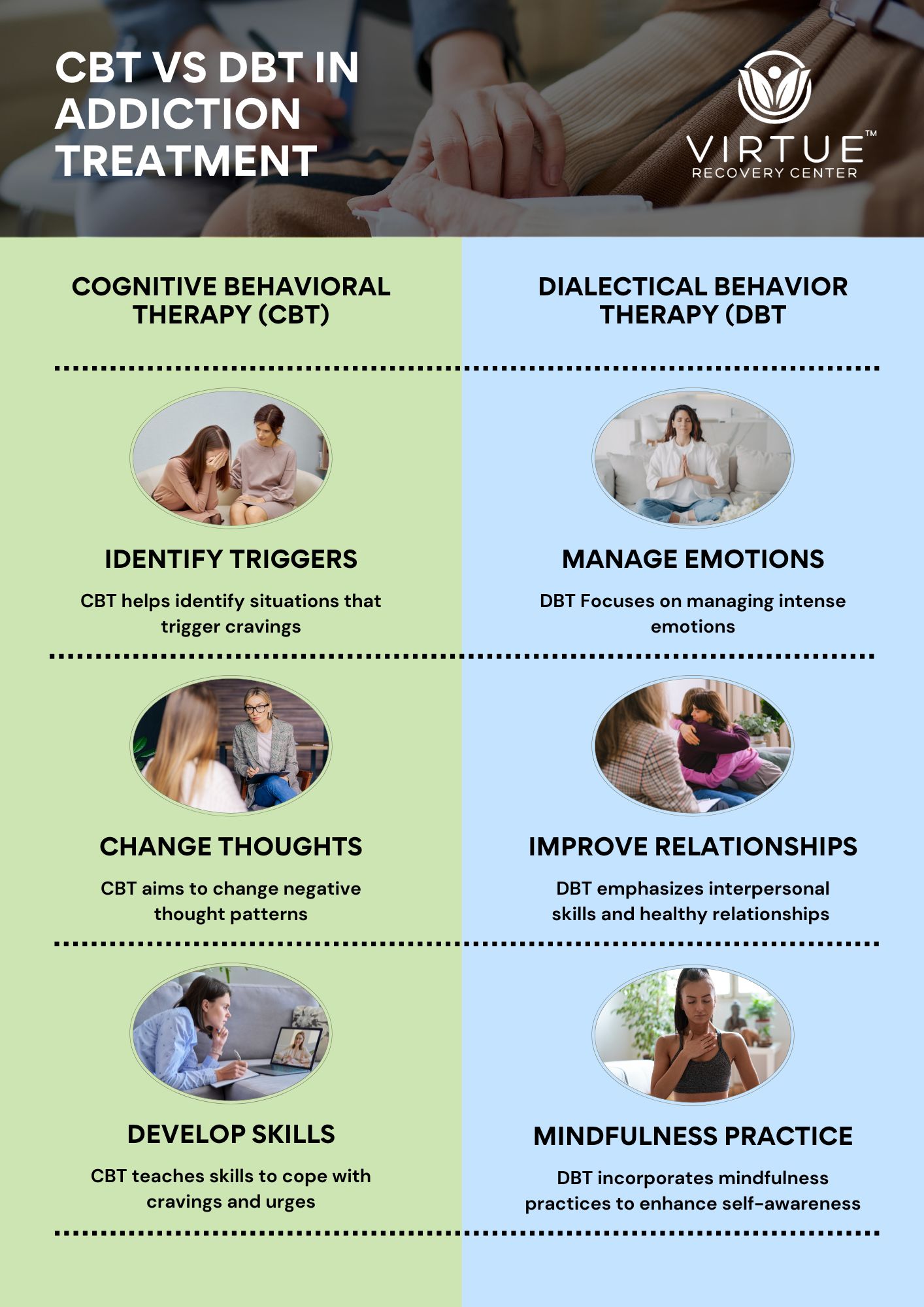Virtue Recovery Center is dedicated to providing specialized rehabilitation services for veterans across Texas, Arizona, Nevada, and Oregon, focusing on addressing both substance abuse and mental health disorders. Our tailored programs are designed to support veterans as they transition back to civilian life while dealing with these specific challenges.
 Central to our offerings is our substance abuse recovery program, which recognizes that veterans often turn to substances as a way to cope with their complex experiences. Through evidence-based therapies, counseling, and a strong peer support network, we empower veterans to overcome addiction and regain control over their lives. Moreover, our trauma-focused therapy acknowledges the profound impact of military experiences on mental health. Utilizing proven techniques like cognitive-behavioral therapy and eye movement desensitization and reprocessing (EMDR), we facilitate emotional healing and provide veterans with tools to manage conditions such as post-traumatic stress disorder (PTSD) and related mental health issues. At Virtue Recovery Center, we stand by our commitment to helping veterans heal and thrive.
Central to our offerings is our substance abuse recovery program, which recognizes that veterans often turn to substances as a way to cope with their complex experiences. Through evidence-based therapies, counseling, and a strong peer support network, we empower veterans to overcome addiction and regain control over their lives. Moreover, our trauma-focused therapy acknowledges the profound impact of military experiences on mental health. Utilizing proven techniques like cognitive-behavioral therapy and eye movement desensitization and reprocessing (EMDR), we facilitate emotional healing and provide veterans with tools to manage conditions such as post-traumatic stress disorder (PTSD) and related mental health issues. At Virtue Recovery Center, we stand by our commitment to helping veterans heal and thrive.
Who qualifies as a veteran?
A veteran is an individual who has served in active military duty and received a discharge under conditions other than dishonorable. Such circumstances can elevate the likelihood of developing a substance use disorder. The branches of the military encompass the Army, Navy, Air Force, Marine Corps, Coast Guard, National Guard, and Space Force.
What is the VA?
The Department of Veterans Affairs, commonly abbreviated as VA, oversees veteran benefit programs for veterans and their families. These programs encompass rehabilitation, education, compensation for disability or death, and reimbursement for veterans’ drug treatment centers. Virtue Recovery Centers customizes substance use treatment programs specifically to address the unique needs of veterans.
The Importance of Rehabilitation Treatment for Veterans
Veterans frequently pursue rehabilitation treatment for diverse reasons rooted in their military backgrounds and the complexities of reintegrating into civilian society. These reasons include dealing with substance abuse, handling trauma-related challenges like PTSD, addressing physical injuries sustained during service, and managing mental health conditions such as depression and anxiety. The shift to civilian life can trigger difficulties related to isolation, family dynamics, and employment, compelling veterans to seek rehabilitation for essential support and guidance. These programs equip veterans with the tools necessary to rebuild relationships, regulate emotions, and successfully reintegrate into society.
What are Alcohol Treatment Centers for Veterans?
Alcohol treatment centers for veterans offer a structured environment and essential support to help individuals achieve lasting sobriety. Virtue Recovery Centers’ programs are specifically crafted to tackle the psychological, emotional, and medical facets of addiction. This approach empowers military veterans to establish a strong foundation using a blend of personalized, group, and holistic treatments.
What are Drug Treatment Centers for Veterans?
Drug addiction treatment centers tailored for military veterans and specialized substance use programs are meticulously crafted to cater to the distinctive needs of those who have served in the armed forces. At Virtue Recovery Centers, evidence-based practices are employed to aid veterans in achieving enduring recovery. Therapists create personalized treatment plans that comprehensively address both the medical and mental health requirements of individuals.
It’s not uncommon for service members, both recently returned from active duty and those whose last deployment was years ago, to experience stress related to their military service. The unique challenges faced by military personnel elevate the risk of alcohol addiction or illicit drug use.
While the consumption of alcoholic beverages is legal across all states and marijuana use is permitted in certain states, excessive use can lead to severe issues, including mental health disorders and legal consequences. If you are uncertain whether you or a loved one is grappling with addiction, Virtue Recovery Center offers a free assessment that can be accessed by calling today.
What are Inpatient Substance Abuse Programs for Veterans Offered by the VA?
VA inpatient substance abuse programs vary in their formats. Long-term rehabilitation has shown superior effectiveness compared to shorter programs, and intensive inpatient programs provide additional support for addiction and co-occurring mental health conditions in veterans. At Virtue Recovery Center, each program prioritizes sobriety and aims to equip individuals with the skills necessary for sustained success.
The inpatient admission process commences with a confidential assessment, leading to the formulation of a personalized treatment plan. Individuals receive round-the-clock medical and emotional support within a highly structured environment. As full-time residents, they benefit from diverse inpatient treatment methods and holistic approaches encompassing detoxification, therapy, and overall treatment.
What are Outpatient Substance Abuse Programs Offered by the VA?
VA outpatient substance abuse programs at Virtue Recovery Centers provide a structured therapeutic setting for individuals to participate in while living at home. Intensive outpatient programs are designed for those who require treatment but do not need round-the-clock care. Following the completion of an intensive program, an outpatient aftercare program offers ongoing support and assistance from a dedicated staff, aiding individuals in their transition to a daily routine.
Do Veterans Rehabilitation Centers Offer Mental Health Services?
Yes, mental health treatment is a crucial aspect of both VA inpatient and outpatient substance abuse programs. There is a significant prevalence of mental health issues among those who have retired from active military service. Virtue Recovery Centers address co-occurring mental health conditions, including post-traumatic stress disorder (PTSD), anxiety, and major depressive disorder, alongside substance use disorders.
Nearby Virtue Recovery Centers provide residential and outpatient treatment options for veterans dealing with mental health conditions or substance use disorders. These facilities are nationally accredited, state-licensed, certified, and staffed with experienced professionals. Virtue Recovery Centers strive to make accessing the necessary help as straightforward as possible.
Do Veterans Rehabilitation Centers Offer Dual Diagnosis Treatment?
Certainly. Veterans diagnosed with a substance use disorder often grapple with co-occurring mental health challenges, a condition known as dual diagnosis. Addressing both issues effectively demands a personalized treatment approach. The skilled professionals at Virtue Recovery Center recognize the interconnected nature of these diagnoses; treating them separately often hampers success rates.
A robust dual-diagnosis rehabilitation program employs evidence-based, integrated treatments, equipping veterans with the necessary tools for sustainable recovery. Many veterans with mental health conditions resort to self-medication, using substances to alleviate their symptoms.
Navigating the detoxification process from drug or alcohol addiction can be daunting. Thankfully, with the guidance of experienced practitioners at nearby Virtue Recovery Centers, veterans undergo a safe detox period. Upon completion of detoxification, active participation in therapy becomes the next pivotal step in their recovery journey.
Conducting Addiction Assessments: Do Veterans Rehab Centers Accept Health Insurance?
Yes, health insurance plans typically offer some level of coverage for addiction treatment, including policies managed by third-party administrators for self-funded employers and insurance carriers. VA healthcare benefits also cover substance use treatment programs for veterans. Additionally, individuals aged 25 and younger may be covered under their parent’s insurance policy. To ascertain your specific coverage, please call Virtue Recovery Center confidentially at 866-806-1224.
Reach out to us at 866-806-1224. We are affiliated with several insurance providers, including Aetna, and Cigna. Our team can thoroughly review your policy, explaining its details, limitations, requirements, and more.
TYPES OF VETERANS REHAB PROGRAMS ELIGIBLE FOR INSURANCE COVERAGE
Insurance plans for veterans often encompass a variety of essential rehab programs customized to individual needs, including:
- Substance Abuse Rehabilitation: Coverage typically includes detoxification, counseling, therapy, and support groups to address addiction challenges.
- Mental Health Treatment: Insurance often covers therapy, psychiatric evaluations, and medication management for conditions like PTSD and depression.
- Trauma-Informed Care: Veterans can access trauma-focused therapies such as Cognitive-Behavioral Therapy (CBT) and Eye Movement Desensitization and Reprocessing (EMDR).
- Dual Diagnosis Programs: Coverage extends to integrated treatment plans for veterans dealing with both substance abuse and mental health disorders.
- Outpatient Services: Insurance plans frequently include outpatient therapy, counseling, and support groups for flexible care.
- Residential Treatment: Some plans cover immersive inpatient rehab programs providing structured recovery environments.
- Medication-Assisted Treatment (MAT): Insurance may support MAT programs combining medication with counseling for opioid or alcohol addiction.
Is Veterans Rehab Covered by VA?
Veterans seeking assistance for substance use issues can find support through VA hospitals, which provide aid for problems like PTSD and depression. VA facilities offer medically-managed detoxification and drug substitution therapies. They provide short-term outpatient and intensive outpatient treatments, and some even offer residential care, including specialized inpatient programs for specific concerns like women or homeless veterans.
Does VA Provide Coverage for Outpatient and Inpatient Rehab?
Certainly, the Department of Veterans Affairs (VA) does cover both outpatient and inpatient rehab services for eligible veterans. VA delivers a range of healthcare services, including substance abuse and mental health treatment, through its network of medical centers and clinics.
Outpatient rehab programs often include counseling, therapy, medication management, and support groups, allowing veterans to receive treatment while maintaining their daily routines. Inpatient rehab programs, on the other hand, offer more intensive care and may involve residing at a VA facility for a specified period. These programs are usually tailored to address specific needs such as substance abuse recovery, mental health support, or other medical conditions.
Veterans are encouraged to collaborate with their VA healthcare providers to determine the most suitable rehab treatment based on their individual needs and circumstances. Eligibility for VA services and the specific coverage provided can vary, so it’s advisable to contact the VA for detailed information about available options and benefits.
Is Veterans Rehab Covered by Medicaid?
Certainly, Medicaid provides coverage for veterans’ alcohol treatment centers and drug treatment centers. It is among the most prevalent government-funded programs, and the services available to veterans are determined by the state. Rehab insurance, which includes addiction treatment, is usually covered under behavioral health services through Medicaid. To confirm your Medicaid coverage, you can conveniently contact Virtue Recovery Center at 866-806-1224.
Does Virtue Recovery Center Honor TriWest?
Absolutely. Virtue Recovery Centers welcome TriWest Healthcare Alliance, a collaborator with the VA and the Department of Defense (DoD) in managing veteran healthcare initiatives for military veterans and their families. TriWest is not an insurance company; rather, it administers programs like Tricare, Medicare, Medicaid, and commercial health plans for active duty members of the Armed Forces and veterans.
Does My Health Insurance Plan Cover Rehab?
If you have a health insurance plan with one of the providers listed below, you can read our guide to find out if your coverage includes drug and alcohol rehabilitation programs.
- Aetna Rehab?
- Baylor Scott & White Rehab?
- Blue Cross Blue Shield Rehab?
- Cigna Rehab?
- HealthSmart Rehab?
- Magellan Rehab?
- Medicaid Rehab?
- MultiPlan Rehab?
- OWCP Rehab?
- TriWest Rehab?
WHAT IS THE COST OF VETERANS DRUG AND ALCOHOL REHABILITATION?
The expenses associated with VA inpatient rehab or substance use treatment programs for veterans are contingent on multiple factors. While costs can vary significantly, the Affordable Care Act (ACA) mandates addiction treatment coverage, requiring all insurance plans to offer support. The extent of coverage varies between policies. To ascertain your specific insurance coverage, the most straightforward approach is to contact us at 866-461-339.
VA drug treatment centers provide a range of veteran services and diverse levels of care. Factors such as the program’s duration, the facility’s location, and the need for inpatient or outpatient treatment play a role in determining costs. Depending on the facility, a 30-day inpatient treatment program can range from $5,000 to $30,000, while outpatient programs typically cost between $1,400 and $10,000 for a 30-day program.
How to Cover the Costs of Veterans Substance Abuse Rehab Treatment
There are various methods to pay for substance use treatment programs designed for veterans. Most insurance companies provide some level of coverage. To determine your specific coverage, you can easily contact Virtue Recovery Center at 866-461-339. For veterans without coverage from VA healthcare, Medicaid, or private insurance, there are additional options to consider.
It’s important to recognize that investing in rehab is worthwhile even without insurance. While it can be financially challenging, it can reduce immediate medical and legal expenses. In the long run, it eliminates the costs associated with substance abuse, enhances potential income, and alleviates the strain substance use places on personal relationships.
One option is to finance treatment through a personal loan from a bank. Negotiating fees with veterans’ drug treatment centers is another avenue. Many centers offer sliding scale fees, which adjust treatment costs based on the veteran’s income and ability to pay, making treatment more accessible.
Employed veterans might have access to Employee Assistance Programs (EAPs) provided by their employer. These programs can assist in covering the expenses of inpatient and outpatient substance use programs. Additionally, community-based groups and faith-based programs may operate clinics or offer grants and scholarships to help finance rehabilitation treatment.
VETERANS REHAB ADMISSIONS AND TREATMENT PROCESS
The journey to recovery begins with the admission process at a local Virtue Recovery Center, where supportive care is paramount. Treatment programs are tailored to suit the unique needs of individual military service members, enabling them to engage fully and work toward recovery while maintaining their progress. Participants acquire new, enduring skills that reinforce their goals and assist them in maintaining sobriety.
At the core of every program are personalized one-on-one therapy sessions, addressing the psychological and emotional issues often central to veteran mental health and substance use disorders. Customized treatment plans may incorporate process groups, and intimate settings where individuals can confidentially explore their emotions and thoughts.
Within these groups, participants delve into the intricacies of forming healthy interpersonal relationships. Meditation therapy, also known as mindfulness-based therapy, is integrated into the approach. This type of talk therapy includes mindfulness meditation practices. Additionally, music therapy, with its successful track record across various age groups, proves to be an effective holistic method in treating a wide range of veteran mental health conditions.
Daily Routine in a Veterans Substance Abuse Rehab Program
At Virtue Recovery Center’s inpatient veterans drug treatment program, each day commences with a nutritious breakfast. Maintaining a structured environment to reduce stress, the day follows a consistent schedule, beginning and concluding at designated times. Following breakfast, participants engage in a variety of activities, including one-on-one and group meetings, educational sessions, and holistic approaches, all geared toward establishing a foundation of healthy habits.
Are Rehab Centers Appropriate for Senior Veterans?
Substance use disorders can affect individuals of all age groups. Compulsive substance use can escalate, necessitating treatment at a VA inpatient rehab facility. Virtue Recovery Center, conveniently located, prioritizes individual care and recognizes specific needs, including those of elderly individuals who may require additional physical or mental support.
How to Enroll a Veteran in Rehab
If you or a loved one is grappling with substance use, know that help is available. You are not alone. To gather information, check insurance coverage, or undergo a remote free assessment for drug and alcohol addiction, reach out to Virtue Recovery Centers at 866-806-1224. Our compassionate admission professionals ensure a straightforward and comfortable process, whether it’s a planned or emergency admission.
Statistics and Insights on Veterans Rehab
Military service environments often amplify the risk of substance use disorders. According to the U.S. Army:
- 22% of soldiers in one unit reported heavy or hazardous drinking, defined as consuming four or more drinks daily or over 14 drinks per week for men, and more than 7 drinks weekly for women.
- The 2021 Health of the Force report highlighted that the highest rate of substance use disorders in soldiers was observed in those under 25 years.
- Service members tend to engage in binge drinking more than civilians, partly viewing alcohol as a coping mechanism or a way to bond with peers.
- Deployments, extended work hours, and permanent changes in living situations serve as stressors potentially contributing to substance use disorders.
The term “luxury rehab” signifies comprehensive care. Residential luxury treatment programs, including Virtue Recovery Centers, provide 24-hour medical and mental health support from licensed professionals. Patients access both traditional and nontraditional evidence-based treatments. For veterans facing substance use disorders, these facilities offer specialized VA inpatient luxury rehab care.
As per the National Institute on Drug Abuse:
- Over 10% of veterans are diagnosed with a substance use disorder, a rate higher than the general population.
- Veterans face unique risk factors such as pain, trauma, and homelessness, contributing to substance abuse.
- Post-military service, illicit drug use surges, predominantly within the veteran community. Concerns involve marijuana, heroin, cocaine, and prescription pain management.
- Opioid overdose rates in veterans increased from 14% in 2010 to 21% in 2016, correlating with a rise in opioid prescriptions from 17% to 24%.
- Veterans exhibit higher tobacco product usage (smoking, vaping, chewing) than civilians, costing the VA health system an estimated $2.7 billion for ambulatory care, prescriptions, and hospitalizations.
- 11% of new Veterans Health Administration patients meet the criteria for a substance use disorder, often accompanied by co-occurring mental health issues such as PTSD, anxiety, and depression.
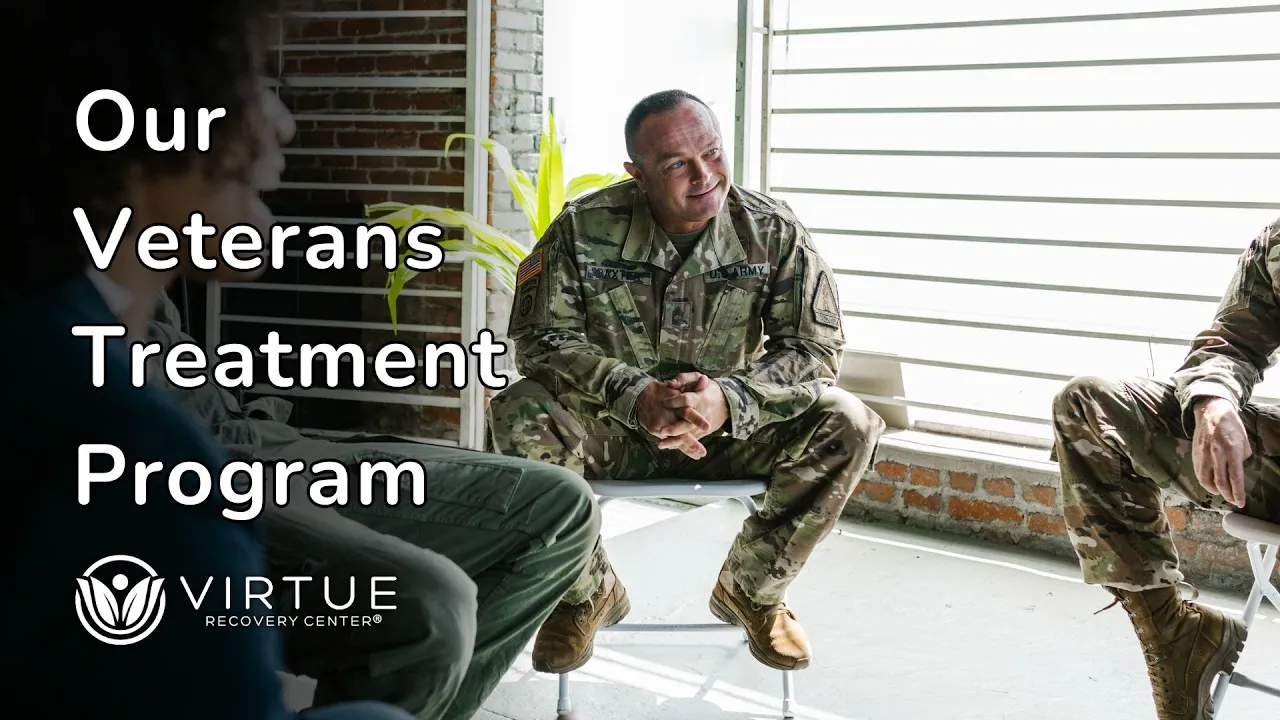
Glossary of Terms for Veterans Addiction Treatment
Veterans Addiction Treatment
A specialized program designed to address the unique substance use and mental health challenges faced by military veterans, including PTSD, depression, and addiction.
Post-Traumatic Stress Disorder (PTSD)
A mental health condition triggered by experiencing or witnessing a traumatic event is often prevalent among veterans and frequently co-occurring with addiction.
Dual Diagnosis
A treatment approach addressing both addiction and co-occurring mental health disorders, such as PTSD, anxiety, or depression, simultaneously.
Trauma-Informed Care
A therapeutic approach that recognizes the impact of trauma on veterans and ensures a safe, respectful, and supportive environment for recovery.
Medication-Assisted Treatment (MAT)
The use of FDA-approved medications, alongside therapy, to help veterans manage withdrawal symptoms and reduce cravings during addiction recovery.
Cognitive Behavioral Therapy (CBT)
An evidence-based therapy that helps veterans identify and change harmful thought patterns and behaviors contributing to addiction and mental health issues.
Military Sexual Trauma (MST)
Psychological trauma resulting from sexual assault or harassment experienced during military service may lead to addiction or mental health challenges.
Triggers
Events, environments, or emotions that can prompt cravings or relapse. Identifying and managing triggers is a core part of veterans’ addiction treatment.
Holistic Treatment
A comprehensive approach that addresses physical, mental, and emotional well-being through therapies like yoga, mindfulness, nutrition, and fitness programs.
Relapse Prevention
Strategies and tools are designed to help veterans maintain sobriety by recognizing triggers, managing cravings, and building healthy habits.
Service-Connected Disabilities
Injuries or conditions resulting from military service may contribute to chronic pain, mental health struggles, or addiction.
Aftercare
After completing a treatment program, ongoing support, including therapy, support groups, and alumni programs, is provided to maintain long-term recovery.
Veterans Affairs (VA)
A government agency that provides benefits and services to military veterans, including support for addiction treatment and mental health care.
Peer Support
Encouragement and understanding are provided by fellow veterans in recovery, fostering a sense of community and shared experience.
Family Therapy
Counseling sessions involving family members to improve communication, repair relationships, and create a supportive recovery environment for veterans.
Hyperarousal
A symptom of PTSD common among veterans, characterized by heightened anxiety, irritability, and an increased state of alertness.
Mindfulness-Based Stress Reduction (MBSR)
A therapeutic approach incorporating mindfulness and meditation to help veterans manage stress, anxiety, and triggers during addiction recovery.
Moral Injury
The psychological distress experienced by veterans after actions or events that conflict with their moral or ethical beliefs often leads to substance use as a coping mechanism.

